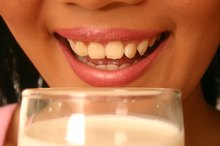Vitamins for a 2-Year-Old
You may provide healthy and balanced meals and snacks, but that doesn't mean your 2-year-old is going to eat them. You may worry that between the finickiness, food jags and meal skipping, your toddler is not getting all the nutrients needed to grow. The American Academy of Pediatrics says children don't need additional vitamin supplementation beyond the recommended dietary allowances. Knowing the vitamin needs for a 2-year-old may help ease your mind that your little one is getting enough. Consult your pediatrician if concerned about your child's diet and nutrient intake.
Fat-Soluble Vitamins
The fat-soluble vitamins include A, D, E and K. A 2-year-old needs 300 micrograms of vitamin A, 200 international units of vitamin D, 6 milligrams of vitamin E and 30 micrograms of vitamin K. If your 2-year-old drinks milk, getting enough vitamin A and D should not be a problem, with 149 micrograms of vitamin A and 115 to 124 IU of vitamin D in a 1-cup serving of skim milk. Carrots, sweet potatoes and eggs are also good sources of vitamin A, while vitamin D is also found in yogurt and salmon, as well as eggs. Using vegetable oils, such as safflower oil, can help your 2-year-old get enough vitamin E, as can mangoes and kiwi fruit. Broccoli and spinach are both good sources of vitamins E and K.
- The fat-soluble vitamins include A, D, E and K. A 2-year-old needs 300 micrograms of vitamin A, 200 international units of vitamin D, 6 milligrams of vitamin E and 30 micrograms of vitamin K. If your 2-year-old drinks milk, getting enough vitamin A and D should not be a problem, with 149 micrograms of vitamin A and 115 to 124 IU of vitamin D in a 1-cup serving of skim milk.
- Carrots, sweet potatoes and eggs are also good sources of vitamin A, while vitamin D is also found in yogurt and salmon, as well as eggs.
B Vitamins
Kids' Vitamins to Boost the Immune System & Fight Colds
Learn More
The group of B vitamins includes thiamine, niacin, riboflavin, folate, pantothenic acid and vitamins B-6 and B-12. The vitamins are found in a variety of foods, and a deficiency of any of them is rare in the U.S., according to the Colorado State University Extension. Meat, poultry, milk, cereal, bread, eggs and vegetables can all help your 2-year-old get his daily dose of B vitamins. If your child does not eat animal products, you may need to discuss the need to supplement with vitamin B-12 with your pediatrician.
- The group of B vitamins includes thiamine, niacin, riboflavin, folate, pantothenic acid and vitamins B-6 and B-12.
- Meat, poultry, milk, cereal, bread, eggs and vegetables can all help your 2-year-old get his daily dose of B vitamins.
Vitamin C
Vitamin C deficiency is also rare in the U.S., says the Colorado State University Extension. A 2-year-old needs 15 milligrams of vitamin C a day. One orange contains 70 milligrams. Other good sources of vitamin C include broccoli, red and green peppers, green peas, kiwi fruit and cantaloupe.
- Vitamin C deficiency is also rare in the U.S., says the Colorado State University Extension.
- A 2-year-old needs 15 milligrams of vitamin C a day.
Balanced Diet
Safety of Taking B12 While Nursing
Learn More
You can't force your 2-year-old to eat something she doesn't want to eat, but providing a variety of healthy foods throughout the day helps ensure she gets the nutrients she needs to grow and develop. A healthy and balanced diet for a 2-year-old includes a variety of fruits and vegetables, grains such as bread and cereal, lean proteins like chicken, and low-fat dairy. A 2-year-old may be too busy playing and exploring to take time out to eat; offer healthy snacks such as sliced kiwi fruit or whole-wheat bread and cheese to help her meet her vitamin needs.
Related Articles
References
- HealthyChildren.org: Where We Stand: Vitamins
- Office of Dietary Supplements: Vitamin A
- Office of Dietary Supplements: Vitamin D
- Office of Dietary Supplements: Vitamin E
- Office of Dietary Supplements: Vitamin C
- Harvard School of Public Health. Three of the B vitamins: folate, vitamin B6, and vitamin B12.
- Rubin LP, Ross AC, Stephensen CB, Bohn T, Tanumihardjo SA. Metabolic effects of inflammation on vitamin A and carotenoids in humans and animal models. Adv Nutr. 2017;8(2):197-212. doi:10.3945/an.116.014167
- Sproston NR, Ashworth JJ. Role of C-reactive protein at sites of inflammation and infection. Front Immunol. 2018;9:754. doi:10.3389/fimmu.2018.00754
- Bird RP. The emerging role of vitamin B6 in inflammation and carcinogenesis. Adv Food Nutr Res. 2018;83:151-194. doi:10.1016/bs.afnr.2017.11.004
- Chambial S, Dwivedi S, Shukla KK, John PJ, Sharma P. Vitamin C in disease prevention and cure: an overview. Indian J Clin Biochem. 2013;28(4):314-28. doi: 10.1007/s12291-013-0375-3
- Forrest KY, Stuhldreher WL. Prevalence and correlates of vitamin D deficiency in US adults. Nutr Res. 2011;31(1):48-54. doi:10.1016/j.nutres.2010.12.001
- Zhang Y, Leung DY, Richers BN, et al. Vitamin D inhibits monocyte/macrophage proinflammatory cytokine production by targeting MAPK phosphatase-1. J Immunol. 2012;188(5):2127-35. doi:10.4049/jimmunol.1102412
- Saboori S, Shab-bidar S, Speakman JR, Yousefi rad E, Djafarian K. Effect of vitamin E supplementation on serum C-reactive protein level: a meta-analysis of randomized controlled trials. Eur J Clin Nutr. 2015;69(8):867-73. doi:10.1038/ejcn.2014.296
- National Institutes of Health. Vitamin K fact sheet for health professionals. Updated July 2019.
- Aslam MF, Majeed S, Aslam S, Irfan JA. Vitamins: key role players in boosting up immune response-a mini review. Vitam Miner. 2017; 6:153. doi:10.4172/2376-1318.1000153
- Harvard School of Public Health. Three of the B vitamins: folate, vitamin B6, and vitamin B12.
- National Institutes of Health. Folate fact sheet for health professionals. Updated July 2019.
- Palermo A, Tuccinardi D, D'Onofrio L, et al. Vitamin K and osteoporosis: myth or reality? Metabolism. 2017 May; 70:57-71. doi:10.1016/j.metabol.2017.01.032
- Valentini L, Pinto A, Bourdel-Marchasson I, et al. Impact of personalized diet and probiotic supplementation on inflammation, nutritional parameters and intestinal microbiota - The "RISTOMED project": Randomized controlled trial in healthy older people. Clin Nutr. 2015 Aug;34(4):593-602. doi:10.1016/j.clnu.2014.09.023
Writer Bio
Jill Corleone is a registered dietitian and health coach who has been writing and lecturing on diet and health for more than 15 years. Her work has been featured on the Huffington Post, Diabetes Self-Management and in the book "Noninvasive Mechanical Ventilation," edited by John R. Bach, M.D. Corleone holds a Bachelor of Science in nutrition.









